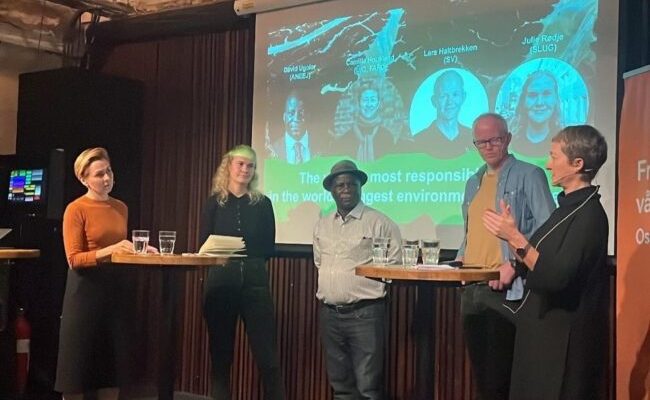Nigeria may find it difficult to execute a green transition because its huge debt profile has kept locked in on fossil fuel production to service debt. This was part of the submissions at a panel discussion when a delegation of rights groups, led by the Africa Network for Environment and Economic Justice (ANEEJ), visited Norway to raise awareness among citizens’ groups, community leaders and decision-makers about environmental damage in the Niger Delta caused by Shell and other oil companies.
Among the key stakeholders the activists will be engaging is the Norwegian Oil Fund (Norges Bank Investment Management – NBIM).

The Norwegian Oil Fund (NBIM) is one of the world’s largest funds. Shell is its seventh largest holding and NBIM is the oil company’s top three shareholder as of August 2022.
According to ANEEJ Executive Director, Rev David Ugolor, other members of the delegation are Celestine Nkabari, leader of Ogoni Solidarity Forum and the Peoples Advancement Centre; Affiah Bridget, Executive Director, Ideal Women Advancement Initiative, and Goodluck Odua Macaulay, Campaign Officer for the Niger Delta Youth Alliance, NIDYA.
Ugolor said the visit to Norway was to “provide an opportunity to get a clear response from NBIM about their investment in Nigeria.”
Members of the ANEEJ delegation met on Tuesday at a breakfast meeting with stakeholders in Norway. The meeting included a panel with Ugolor from ANEEJ, Camilla Houeland, associate professor at the Department of Sociology and Human Geography at the University of Oslo (UiO), Julie Rødje, director at SLUG – Debt Justice Network Norway and Lars Haltbrekken, Member of Parliament for The Socialist Left Party (The Standing Committee on Energy and the Environment).
Rødje noted that “Nigeria is a country with a high level of debt. 29 percent of the 2023 budget is being spent on debt. Health, education and infrastructure combined is 19 percent.”
Rødje whose Master’s programme brought her to the Niger Delta in 2017 for a study, added that:
“The struggle with the debt situation is huge. Nigeria is in a fossil-fuel lock-in because they have to spend so much money on debt servicing that they are sort of forced to continue with the oil and gas production in order to earn money so that they can pay off the debts.
“It is a big problem for countries with this high level of debt to transition. An IMF report said Nigeria would need $177bn to meet its promise to cut 50 percent of emissions by 2030. This situation enables Shell to continue its exploitation of the Niger Delta. This hinders the opportunity for a green transition and a responsible economy.”
In his remarks, Ugolo added: “When you are a debtor, you are not able to implement economic policies that will give you that sovereignty. When you have lost that sovereignty, you cannot hold these companies accountable. Do we now keep quiet and remain like that? No! That is why we are engaging and asking that countries like Norway that value their image should be held accountable.”
He advocated that the Norwegian Oil Fund should not only divest from Shell but should also see to it that environmental remediation takes place in the polluted Niger Delta communities.
READ ALSO FROM NIGERIAN TRIBUNE







